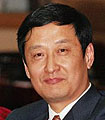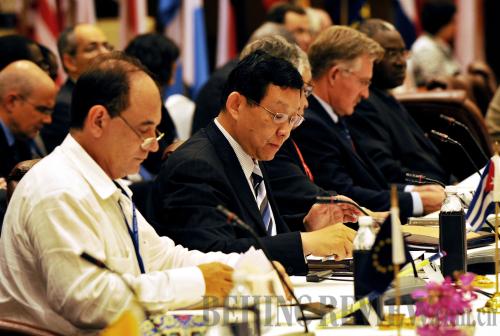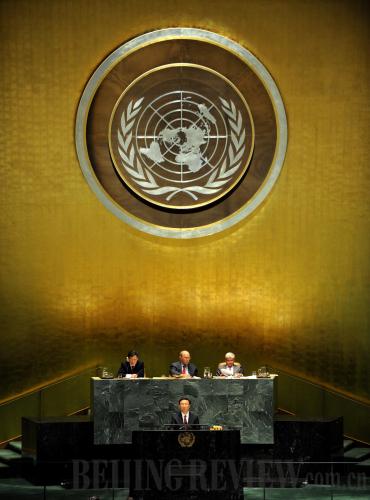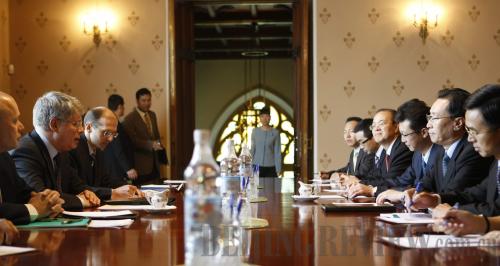|
 |
|
COURTESY OF WANG YIZHOU | The year 2009 has been an extraordinary one for China. The National Day military parade on October 1, in particular, showed to the international community the enhanced pride of the Chinese nation as well as its willingness to cooperate with the rest of the world.
Six decades ago, Mao Zedong declared the birth of the People's Republic of China (PRC) at the Tiananmen Rostrum. The past 60 years, long considered a life cycle in traditional Chinese culture, have witnessed an arduous path in the evolution of this great nation.
 |
|
AGREEING TO AGREE: Chinese Minister of Commerce Chen Deming (second left) participates in a ministerial meeting of the World Trade Organization in New Delhi, India, on September 3 (WANG YE) | The predecessor of the PRC was a weak, poor and disunited country, often disdained as the "sick man of Asia." Since the founding of the PRC in 1949, however, great changes have taken place.
By observing the themes of China's diplomacy over the year 2009, the review and summary of experience over the past 60 years take the lead.
New China's development can generally be divided into two periods. From 1949 to 1979, China established itself as an Asian power that is both politically independent and capable of resisting the aggression of any foreign power. In this period, however, the country's economy failed to make considerable gains, and remained at a marginal position in the context of the world economy.
From 1979 to 2009, China generated one of the greatest economic miracles in recent world history by maintaining an annual growth rate of nearly 10 percent on average for 30 years straight. Over the three decades, it has turned itself into one of the world's top three economic powers as well as the largest and most dynamic emerging market.
 |
|
CHINA'S VOICE: Foreign Minister Yang Jiechi speaks at the United Nations conference on the global financial and economic crisis in New York on June 24 (SHEN HONG) | If we say that Mao was a Chinese representative of independence and revolution, Deng Xiaoping was the helmsman of China's reform and opening up. Together, these two men made the greatest contributions to contemporary China—by making the world acknowledge and respect the resurgence of this powerful nation.
In his speech at the 11th Diplomatic Envoy Conference in July, President Hu Jintao made a thought-provoking review of New China's diplomacy, while charting its future course.
In the new era, China's diplomacy should "thoroughly apply the Scientific Outlook on Development and hold high the banner of peace, development and cooperation," Hu said.
 |
|
TALKING SECURITY: Chinese Vice Foreign Minister Wu Dawei (second right) exchanges views with Russian Deputy Foreign Minister Alexei Borodavkin (second left) regarding nuclear issue on the Korean Peninsula in Moscow on July 4 (LU JINBO) |
While taking both the domestic and international situations into consideration, he added, China must constantly strive to improve its diplomatic work in a bid to make the country a more politically influential and economically competitive nation. All this is aimed at creating an international environment conducive to building a moderately prosperous society and advancing the country's modernization.
Hu's speech dispelled the outside world's concerns about the spread of radical nationalism in China, while assuring the international community that it will never pursue expansionist or confrontational policies.
In addition to the celebration of the 60th anniversary of the PRC and the establishment of new diplomatic goals, China's diplomacy in 2009 also includes three other significant themes.
|
